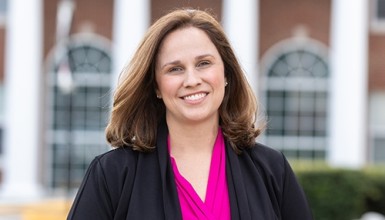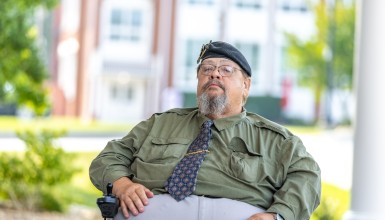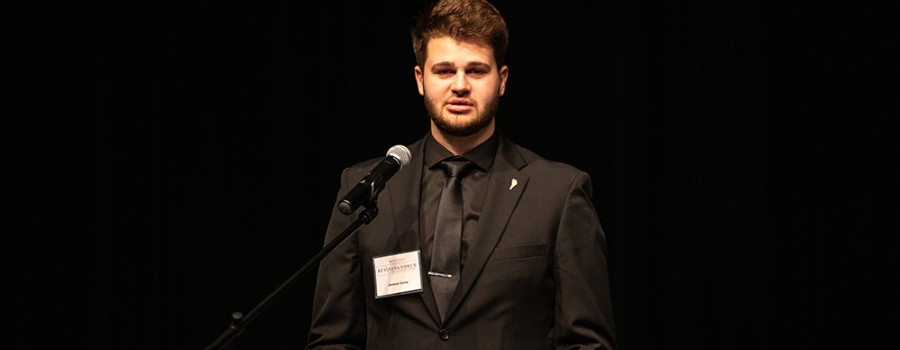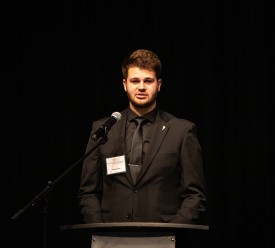Unlock your political potential and use it to improve society.
By studying various topics – from governmental systems to international relations to political behaviors – you will not only learn how the political sphere operates, but you will also make yourself valuable to future employers. Through your bachelor’s degree in political science program, you will learn all about diplomacy, strategy, international politics, political theory, and much more. But it doesn’t stop there. With a political science degree, you can venture into almost any career field with better researching, writing, and public speaking skills. You don’t have to become a big-time politician; you just have to take the next step. After graduating with your bachelor’s in political science, you will be set to make your mark on society. This could be the place where it all starts.
By the Numbers
Programs & Requirements
* The credit hours listed on this page only reference the specific program requirements and is not reflective of the total hours necessary to receive your political science bachelor's degree. Cumberlands requires all students obtain a minimum of 60 hours for an associate’s degree and a total of 120 hours for a bachelor’s degree in political science. Transfer and prior learning credits may be counted toward those totals.
To learn more about our General Education Requirements, please visit the page referenced below or explore our Academic Catalog.
Bachelor of Science in Political Science
Explore the intricacies of politics and get inside the minds of world leaders as you navigate courses that will teach you how government systems work at their cores. Grow in your political and relational capabilities as you learn how to conduct important research and understand what it means to interact with people on an international scale. The knowledge and skills you gain through a bachelor's degree in political science will equip you to help countless people over the years, making a lasting impact in societies around the U.S. — maybe even the world. With a mind prepped for taking on challenges and overcoming expectations, you will take on whichever governmental role you desire and take a leap toward changing the world for the better.
Course Requirements
- POLS 131 - Introduction to Political Science
- POLS 233 - American National Government
- POLS 235 - Introduction to International Relations r
- HIST 224 - Research Mechanics
- HIST 225 - Research Composition
- POLS 490 - Senior Research Composition
- POLS 433 - Constitutional Law OR POLS 434 - Western Political Theory II
- Choose 18 Elective Credit Hours from the political science offerings of the department
A Bachelor of Arts in Political Science requires completing the same courses as a Bachelor of Science with the addition of completing one foreign language sequence through the intermediate level.
- FREN 131 Elementary French I
- FREN 132 Elementary French II
- FREN 231 Intermediate French I
- FREN 232 Intermediate French II
- SPAN 131 Elementary Spanish I
- SPAN 132 Elementary Spanish II
- SPAN 231 Intermediate Spanish I
- SPAN 232 Intermediate Spanish II
Minor in Political Science
Interested in politics but don’t know if you want to make a career out of it? Not a problem! University of the Cumberlands offers a political science minor that gives you the experience of learning what politics, national and international relations, and governmental systems have to offer on a smaller scale so that you’re free to major in whatever else you’d like. A minor in political science will make you stand out on any résumé and guarantee your chances of being successful in the workforce, no matter what professional avenue you take.
Course Requirements
- POLS 131 - Introduction to Political Science
- POLS 233 - American National Government
- POLS 235 - Introduction to International Relations
- POLS 433 - Constitutional Law OR POLS 434 - Western Political Theory II OR POLS 436 - Political Ideologies
- Choose an Additional 12 Credit Hours from the Political Science courses.
Take the Next Step
Mission & Goals
The mission of the bachelor's in political science program at Cumberlands is to teach you the structures and policies of government to prepare you to work in both politics and other areas. Through this program, you will gain:
Political Science Careers & Outcomes
*All statistics from the U.S. Bureau of Labor and Statistics
Political Scientist: $122,510
Political Scientist: $122,510
Political scientists study the origin, development, and operation of political systems. They research political ideas and analyze governments, policies, political trends, and related issues.
Professor: $79,640
Professor: $79,640
Postsecondary teachers instruct students in a variety of academic subjects beyond the high school level. They may also conduct research and publish scholarly papers and books.
Lawyer: $127,990
Lawyer: $127,990
Lawyers, also called attorneys, research the intent of laws and judicial decisions and determine whether they apply to the specific circumstances of their client’s case. They act as both advocates and advisors for one party in a criminal (offense against the state or the nation) or civil (matters between individuals or organizations) proceeding.
News Analyst: $48,370
News Analyst: $48,370
News analysts, reporters, and journalists keep the public updated about current events and noteworthy information. They report international, national, and local news for newspapers, magazines, websites, television, and radio.
Historian: $63,940
Historian: $63,940
Historians conduct research and analysis for governments, businesses, individuals, nonprofits, historical associations, and other organizations. They use a variety of sources in their work, including government and institutional records, newspapers, photographs, interviews, films, and unpublished manuscripts, such as personal diaries, letters, and other primary source documents. They also may process, catalog, and archive these documents and artifacts.
Operations Research Analyst: $82,360
Operations Research Analyst: $82,360
Operations research analysts may be involved in many aspects of an organization. For example, they may help managers decide how to allocate resources, develop production schedules, oversee the supply chain, and set prices.
Common Questions
Political science is a social science focused on governments and systems of power and the analysis of laws and political activities, thoughts, and behaviors. There are a wide range of subdisciplines, such as political economy, international relations, and public policy and administration. Political science shares methodology with other social sciences, like history, psychology, and behavioral science. This allows you to take classes in your area of interest during your political studies. Political science degree programs vary, but generally cover topics such as political theory, international politics, government administration, and diplomacy.
As a political science major at Cumberlands, you will survey the major concepts, issues, and controversies in political science. Whether you are pursuing a poli-sci minor or a bachelor’s degree in political science, you’ll explore public policy, constitutional law, political theory, comparative government, American foreign policy, the presidency, and Congress. With a poli-sci degree, you will be well prepared to begin a new career or further your studies in graduate school.
A lot, actually. Career opportunities for those with a political science degree are numerous. Many graduates with a political science major gain work in government as elected officials or in many other capacities, including lobbyists.
Reasoning, interpreting, analyzing, reading comprehension, pattern recognition, public speaking, problem solving – the skills you’ll gain through a political science degree are highly valued by employers in virtually any industry.
There are plenty of alternative career options that will still utilize what you learned in your political science bachelor's degree. Here are just a few:
- Lawyer
- Journalist
- Business Owner
- Teaching
- FBI Officer
- Foreign Service Officer
- Ambassador
- Historian
- CIA Intelligence Specialist
All programs at University of the Cumberlands are offered at some of the lowest rates in the nation. For more information on how affordable this bachelor's degree in political science would be for you, visit our Financial Aid page.
Faculty Experts in Political Science
Learn more about the political science professors you will interact with.

Catherine Ball, JD

Dr. Michael Spurlock

Dr. Chuck Smith
Request Information
Learn more about all that Cumberlands has to offer.

